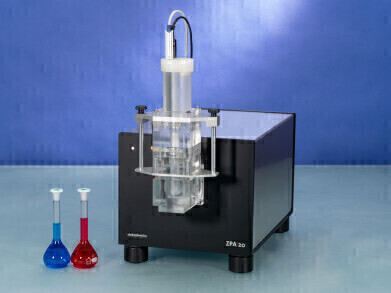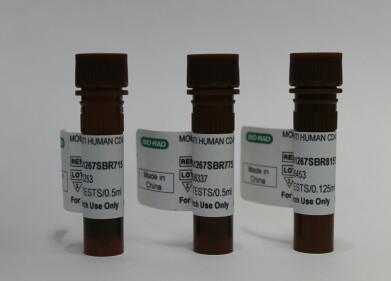-
 The ZPA 20 zeta potential analyzer uses the patented method of bidirectional, oscillatory streaming potential and streaming current analysis. Copyright: DataPhysics Instruments
The ZPA 20 zeta potential analyzer uses the patented method of bidirectional, oscillatory streaming potential and streaming current analysis. Copyright: DataPhysics Instruments -
 The zeta potential (ζ) is the electric potential measured at the shear plane near the solid surface, more precisely at the boundary between the immobile and the diffuse ion layer. Copyright: DataPhysics Instruments
The zeta potential (ζ) is the electric potential measured at the shear plane near the solid surface, more precisely at the boundary between the immobile and the diffuse ion layer. Copyright: DataPhysics Instruments -
 The measuring method of the ZPA 20 – using a piston, the stepper motor pumps the electrolyte fluid up through the measuring cell and back down again. Copyright: DataPhysics Instruments
The measuring method of the ZPA 20 – using a piston, the stepper motor pumps the electrolyte fluid up through the measuring cell and back down again. Copyright: DataPhysics Instruments
Laboratory Products
Zeta Potential Analyzer validated by Leibniz Institute for Polymer Research Dresden
Dec 06 2022
The zeta potential characterises the charge situation at a solid surface in solution. The new ZPA 20 zeta potential analyzer from DataPhysics Instruments uses a patented method based on the analysis of the streaming potential or the streaming current. It is therefore particularly suitable for the investigation of samples in the macroscopic range. The device can be equipped with a measuring cell for solid materials such as plates, membranes, or foils, and a measuring cell for fibres, powders and granulates.
Zeta potential measurements are important in a broad range of applications, such as the investigation of fuel cell membranes, fouling processes of filter membranes, bacterial growth on food packaging, and washing of textiles.
The ZPA 20 zeta potential analyzer had to meet the highest quality standards from the beginning. Thus, the manufacturer DataPhysics Instruments cooperated with a partner of worldwide renown: the Leibniz Institute for Polymer Research Dresden (IPF). As an IPF scientist, Dr Astrid Drechsler has been dealing with the physical chemistry of polymer surfaces, which includes zeta potential measurements.
Since 2017, Drechsler and her team have accompanied the development of the ZPA 20 zeta potential analyzer through several project phases. “In the first phase, we validated data measured with the prototype of the zeta potential analyzer,” said Drechsler. A second project phase enabled further improvements of not only the device but also its measuring cells.
The ZPA 20 zeta potential analyzer uses a patented measuring method to achieve rapid results with high accuracy. Dr Sebastian Schaubach, Innovation Manager at DataPhysics Instruments, explained: “The ZPA 20 zeta potential analyzer is the only measuring device on the market today measuring the streaming potential or streaming current in a bidirectional and oscillating fashion.” The electrolyte solution is pumped over or through the sample not only in one direction but alternately in opposite directions. Therefore, measurement cycles create both positive and negative pressure differences, and consequently positive and negative values of the streaming potential or current. This may prevent the polarisation of the device electrodes.
Additionally, the bidirectional flow can reveal asymmetries of the sample surface, such as, inhomogeneous fibre or powder packages as well as insufficiently fixed flat samples. Therefore, with the oscillating, bidirectional flow of the electrolyte, error sources can be identified, and measurement errors prevented.
Additionally, the ZPA 20 zeta potential analyzer can be expanded with optional modules. For example, with the LDU 25 liquid dosing system, the electrolyte composition can be changed automatically. This allows to determine the isoelectric point or adsorption of surfactants quickly and accurately.
“The cooperation with the IPF helped us to tailor the ZPA 20 zeta potential analyzer to the needs of our customers right from the start and to design it with the highest scientific standards in mind,” said Schaubach, “We are especially proud that the patented measurement method renders zeta potential measurements quicker, easier and more reliable than ever before.”
More information online
Digital Edition
Lab Asia 31.2 April 2024
April 2024
In This Edition Chromatography Articles - Approaches to troubleshooting an SPE method for the analysis of oligonucleotides (pt i) - High-precision liquid flow processes demand full fluidic c...
View all digital editions
Events
May 05 2024 Seville, Spain
InformEx Zone at CPhl North America
May 07 2024 Pennsylvania, PA, USA
May 14 2024 Oklahoma City, OK, USA
May 15 2024 Birmingham, UK
May 21 2024 Lagos, Nigeria



.jpg)













